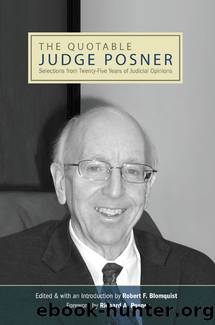The Quotable Judge Posner: Selections From Twenty-Five Years of Judicial Opinions by Robert F. Blomquist

Author:Robert F. Blomquist [Blomquist, Robert F.]
Language: eng
Format: epub
Tags: Political Science, Public Policy, General, American Government, Judicial Branch, Law
ISBN: 9781438430645
Google: eOc_mAEACAAJ
Goodreads: 7563059
Publisher: SUNY Press
Published: 2010-04-29T00:00:00+00:00
Federal Courts
1. The message of Younger and of the recent cases that have expanded its principle to civil proceedings is that one who decides to violate state law that he believes to be unconstitutional may find that he has thereby submitted himself to the jurisdiction of the state courts. Only if he goes to court before violating the law can he be assured of a federal forum, and then only if he satisfies the stringent jurisdictional requirements ⦠for bringing a federal suit to enjoin merely threatened state enforcement action.
Illinois v. General Electric Co. v. Fahner,
683 F.2d 206, 213 (7th Cir. 1982).
2. Jurisdiction cannot be obtained retroactively.
Denberg v. Railroad Retirement Board,
696 F.2d 1193, 1197 (7th Cir. 1983).
3. Although mootness is sometimes painted in black and whiteââfederal courts are without power to decide questions that cannot affect the rights of litigants in the case before themââit really should be painted in shades of gray since few controversies are wholly beyond the power of changed circumstances to revive; but the probability of revival is too small in this case to allow a federal court to exercise jurisdiction.
Commodity Futures Trading Commission v. Board of Trade,
701 F.2d 653, 655 (7th Cir. 1983).
4. This case illustrates most of the reasons why Article III has been construed to forbid advisory opinions. One is a desire to conserve judicial time and effort by avoiding unnecessary adjudication. Even if the State's Attorney prevailed on the merits of his declaratory suit, he still may not bring criminal charges against Archer Daniels Midland.
Illinois v. Archer Daniels Midland Co.,
704 F.2d 935, 941â42 (7th Cir. 1983).
5. Rendering a judgment, and on a constitutional issue (the validity of the Illinois Strikebreakers Act under the supremacy clause) at that, thus might turn out to have no practical significance to the parties. But it would have significance, of an unhappy kind, for the federal courts. A practice of giving advisory opinions would promote friction with the other branches of governmentâhere a state legislatureâby multiplying the occasions on which the federal courts would have to decide whether the government action is invalid.
Id. at 942.
6. You do not ordinarily sue people with whom you have no quarrelâunless this was a means of collusively invoking jurisdiction.
Fidelity & Deposit Co. v. Sheboygan Falls,
713 F.2d 1261, 1267 (7th Cir. 1983).
7. We therefore take this opportunity to remind the bar that a federal court does not acquire subject-matter jurisdiction by consent of the parties.
Minority Police Officer Ass'n v. South Bend,
721 F.2d 197, 199 (7th Cir. 1983).
8. The Association's theory of standing is that minority police officers share with minority applicants to be officers the same interest in preventing discrimination. This may well be true but as a theory of standing it would allow the Association to complain about hiring discrimination against blacks and Hispanics in Boston or San Diego as well as South Bend, and it is perfectly clear that such a complaint could not be made the basis for a federal suit. Feelings of solidarity do not confer standing to sue.
Download
This site does not store any files on its server. We only index and link to content provided by other sites. Please contact the content providers to delete copyright contents if any and email us, we'll remove relevant links or contents immediately.
The Secret History by Donna Tartt(19053)
The Social Justice Warrior Handbook by Lisa De Pasquale(12187)
Thirteen Reasons Why by Jay Asher(8893)
This Is How You Lose Her by Junot Diaz(6877)
Weapons of Math Destruction by Cathy O'Neil(6265)
Zero to One by Peter Thiel(5787)
Beartown by Fredrik Backman(5737)
The Myth of the Strong Leader by Archie Brown(5500)
The Fire Next Time by James Baldwin(5431)
How Democracies Die by Steven Levitsky & Daniel Ziblatt(5215)
Promise Me, Dad by Joe Biden(5141)
Stone's Rules by Roger Stone(5081)
A Higher Loyalty: Truth, Lies, and Leadership by James Comey(4954)
100 Deadly Skills by Clint Emerson(4921)
Rise and Kill First by Ronen Bergman(4780)
Secrecy World by Jake Bernstein(4741)
The David Icke Guide to the Global Conspiracy (and how to end it) by David Icke(4709)
The Farm by Tom Rob Smith(4502)
The Doomsday Machine by Daniel Ellsberg(4484)
